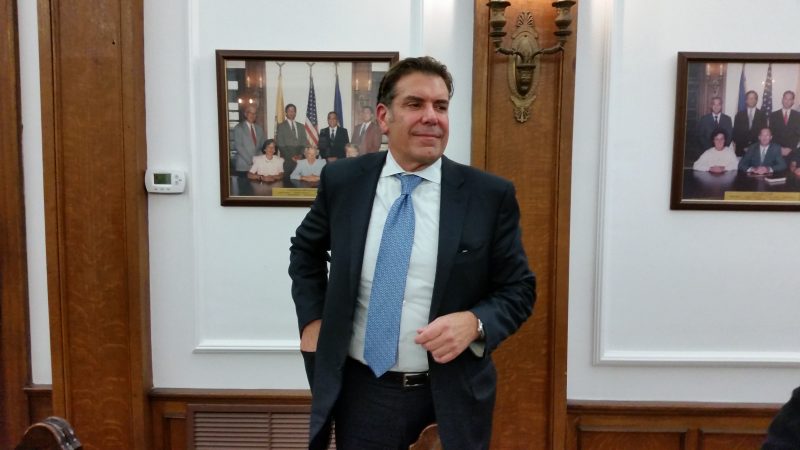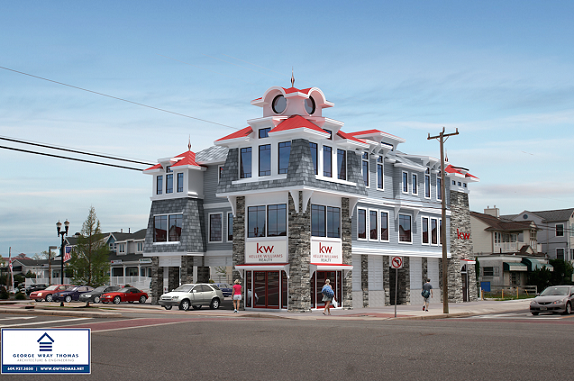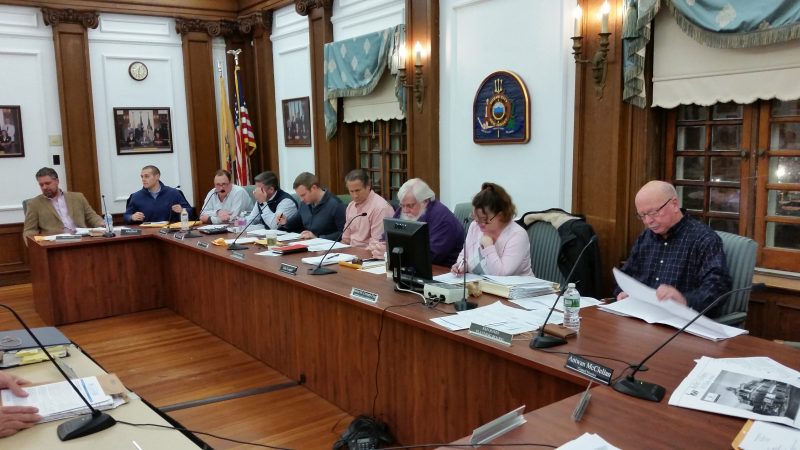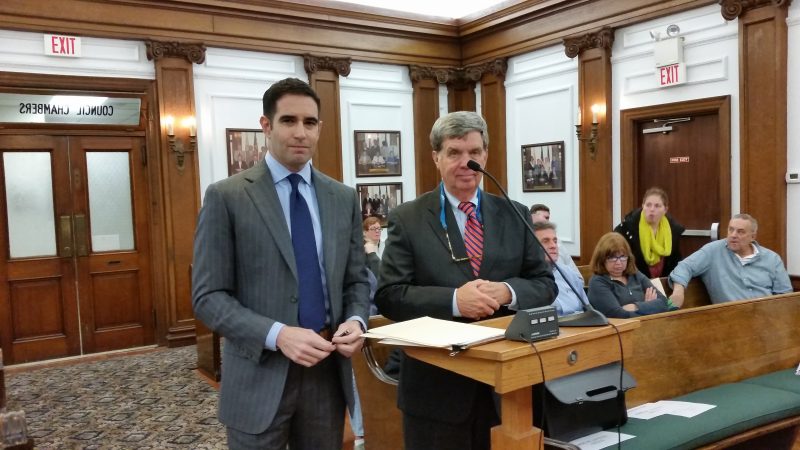Keller Williams' attorney Avery Teitler, left, and architect George Wray Thomas described the project in glowing terms.
 By Donald Wittkowski
Assailed as an oversized “monstrosity” by its critics, a proposed $2 million real estate office that would have been a new commercial centerpiece for the main gateway into town was rejected Wednesday night by Ocean City planners.
The 7-2 Planning Board vote against the corporate headquarters proposed by the Keller Williams realty firm capped a two-hour hearing punctuated by strong opposition and harsh comments from members of the public.
“I feel this building is a monstrosity. It’s too big,” Ocean City resident Marie Hayes said in remarks that were echoed by other critics.
Despite the board’s denial of his project, Keller Williams owner Paul Chiolo said he would not give up on his efforts to develop the site. The office building would occupy a prominent location at the foot of the Ninth Street corridor, the main route to the beaches, Boardwalk and other tourist attractions in the center of town.
“It is our intention to continue on with that site,” Chiolo said in an interview after the meeting.
Chiolo stressed that he was “very disappointed” with the outcome and noted he planned to sit down with his attorney Thursday to consider his options. He did not indicate whether he would consider filing a lawsuit to challenge the vote.
“It was very disappointing. Of course, I’m surprised,” he said. “We had every intention of doing something very beautiful for the city.”
By Donald Wittkowski
Assailed as an oversized “monstrosity” by its critics, a proposed $2 million real estate office that would have been a new commercial centerpiece for the main gateway into town was rejected Wednesday night by Ocean City planners.
The 7-2 Planning Board vote against the corporate headquarters proposed by the Keller Williams realty firm capped a two-hour hearing punctuated by strong opposition and harsh comments from members of the public.
“I feel this building is a monstrosity. It’s too big,” Ocean City resident Marie Hayes said in remarks that were echoed by other critics.
Despite the board’s denial of his project, Keller Williams owner Paul Chiolo said he would not give up on his efforts to develop the site. The office building would occupy a prominent location at the foot of the Ninth Street corridor, the main route to the beaches, Boardwalk and other tourist attractions in the center of town.
“It is our intention to continue on with that site,” Chiolo said in an interview after the meeting.
Chiolo stressed that he was “very disappointed” with the outcome and noted he planned to sit down with his attorney Thursday to consider his options. He did not indicate whether he would consider filing a lawsuit to challenge the vote.
“It was very disappointing. Of course, I’m surprised,” he said. “We had every intention of doing something very beautiful for the city.”
 An architectural rendering depicts the proposed Keller
An architectural rendering depicts the proposed Keller Planning Board members voted 7-2 to reject the project after expressing concerns about traffic and parking.
Board members who voted against the project expressed skepticism about the parking plans and the proposed traffic flow in and out of the site. They also voiced concerns that vehicular traffic generated by the office could create a danger for pedestrians and bicyclists using the nearby walkway along the Route 52 Causeway bridge.
“I’m just not sold on it,” board member Robert Becher said while casting his no vote.
Michael Allegretto, the city’s director of Community Services and Mayor Jay Gillian’s designee on the Planning Board, questioned why Keller Williams had not performed a traffic study for the site. Allegretto noted that the corner of Ninth Street and Bay Avenue, where the project is proposed, is a busy intersection in town.
Avery Teitler, Chiolo’s attorney, told Allegretto that a traffic study was not required for the project. Gary Griffith, the Planning Board’s solicitor, agreed with Teitler.
However, the board members who opposed the project, including Allegretto, repeatedly cited their concerns about traffic flow. In addition, the board members doubted whether Keller Williams’ parking plan would be adequate for the office complex.
“I don’t see it functioning,” John Loeper, the board chairman, said while criticizing the parking plan during his no vote.
Members of the public who addressed the board were overwhelmingly opposed to the project. They said they feared the office building would exacerbate traffic congestion on Ninth Street and could pose a danger to pedestrians and bikers using the Route 52 Causeway bridge.
The biggest concern cited by opponents, though, was the building’s size. Keller Williams has proposed a two-story office containing 6,000 square feet of space. One critic said the building would have been 38 feet high, the height of a three-story structure.
“I think that the building is overwhelming for the site,” said Ocean City resident Michael Hinchman, a former president of Fairness In Taxes, a local government watchdog group.
Mary Trueman, another local resident, told the Planning Board, “The last thing you would want to do is put a gigantic building on the corner.”
Planning Board members voted 7-2 to reject the project after expressing concerns about traffic and parking.
Board members who voted against the project expressed skepticism about the parking plans and the proposed traffic flow in and out of the site. They also voiced concerns that vehicular traffic generated by the office could create a danger for pedestrians and bicyclists using the nearby walkway along the Route 52 Causeway bridge.
“I’m just not sold on it,” board member Robert Becher said while casting his no vote.
Michael Allegretto, the city’s director of Community Services and Mayor Jay Gillian’s designee on the Planning Board, questioned why Keller Williams had not performed a traffic study for the site. Allegretto noted that the corner of Ninth Street and Bay Avenue, where the project is proposed, is a busy intersection in town.
Avery Teitler, Chiolo’s attorney, told Allegretto that a traffic study was not required for the project. Gary Griffith, the Planning Board’s solicitor, agreed with Teitler.
However, the board members who opposed the project, including Allegretto, repeatedly cited their concerns about traffic flow. In addition, the board members doubted whether Keller Williams’ parking plan would be adequate for the office complex.
“I don’t see it functioning,” John Loeper, the board chairman, said while criticizing the parking plan during his no vote.
Members of the public who addressed the board were overwhelmingly opposed to the project. They said they feared the office building would exacerbate traffic congestion on Ninth Street and could pose a danger to pedestrians and bikers using the Route 52 Causeway bridge.
The biggest concern cited by opponents, though, was the building’s size. Keller Williams has proposed a two-story office containing 6,000 square feet of space. One critic said the building would have been 38 feet high, the height of a three-story structure.
“I think that the building is overwhelming for the site,” said Ocean City resident Michael Hinchman, a former president of Fairness In Taxes, a local government watchdog group.
Mary Trueman, another local resident, told the Planning Board, “The last thing you would want to do is put a gigantic building on the corner.”
 Keller Williams' attorney Avery Teitler, left, and architect George Wray Thomas described the project in glowing terms.
Wray and Teitler responded to criticism of the building’s size by noting that Keller Williams had the option under the city’s zoning laws to develop a larger structure. They said the building would be well below the mass density that is allowed.
“It’s not a maxed-out building,” Teitler said. “It’s not a monstrous building for that property.”
Ever since Keller Williams announced its project last year, there has been debate whether an office building would be the best use for the site.
Removal of the blighted former Exxon site is a key piece of the city’s overall plan to beautify the Ninth Street corridor from the bay to the Boardwalk, creating a far more appealing first impression for visitors arriving in town via the Route 52 Causeway bridge.
Originally, Mayor Gillian wanted to convert the old Exxon site into landscaped green space. But during a town hall meeting in October to discuss ideas for redeveloping the Ninth Street corridor, Gillian seemed to endorse the Keller Williams project by calling it a “beautiful place.”
Asked whether Keller Williams would consider selling the old Exxon site to the city now that the Planning Board has rejected its project, Chiolo said he “never even thought of that as an option.”
Keller Williams' attorney Avery Teitler, left, and architect George Wray Thomas described the project in glowing terms.
Wray and Teitler responded to criticism of the building’s size by noting that Keller Williams had the option under the city’s zoning laws to develop a larger structure. They said the building would be well below the mass density that is allowed.
“It’s not a maxed-out building,” Teitler said. “It’s not a monstrous building for that property.”
Ever since Keller Williams announced its project last year, there has been debate whether an office building would be the best use for the site.
Removal of the blighted former Exxon site is a key piece of the city’s overall plan to beautify the Ninth Street corridor from the bay to the Boardwalk, creating a far more appealing first impression for visitors arriving in town via the Route 52 Causeway bridge.
Originally, Mayor Gillian wanted to convert the old Exxon site into landscaped green space. But during a town hall meeting in October to discuss ideas for redeveloping the Ninth Street corridor, Gillian seemed to endorse the Keller Williams project by calling it a “beautiful place.”
Asked whether Keller Williams would consider selling the old Exxon site to the city now that the Planning Board has rejected its project, Chiolo said he “never even thought of that as an option.”